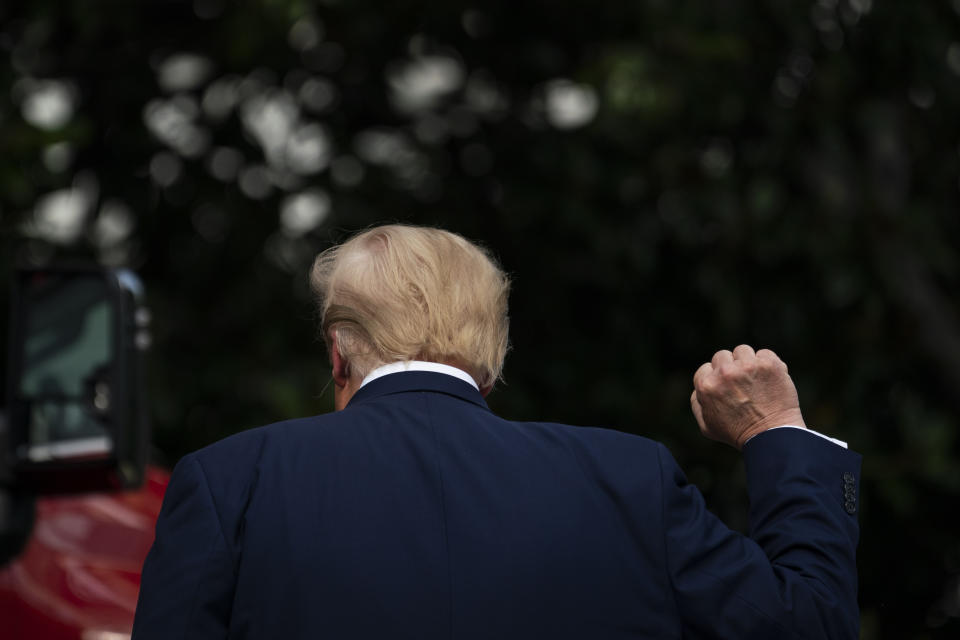Trump seeks suburban votes with attack on fair-housing regulation
Badly trailing Joe Biden in polls for the 2020 election, President Trump is set to rescind an Obama-era fair housing rule next week, in a move that he believes will help resurrect his flagging fortunes with suburban voters.
Trump, who has rarely spoken about the suburbs since being elected, teased his announcement at a White House event Thursday on cutting government regulation.
“The Democrats in D.C. have been and want to at a much higher level abolish our beautiful and successful suburbs by placing far-left Washington bureaucrats in charge of local zoning decisions,” Trump said at an event held in the Rose Garden that often sounded more like a campaign rally. “They are absolutely determined to eliminate single-family zoning, destroy the value of houses and communities already built, just as they have in Minneapolis and other locations that you read about today. Your home will go down in value and crime rates will rapidly rise.”
Saying that Joe Biden “and his bosses from the radical left” would “totally destroy the beautiful suburbs,” Trump then took aim at the 2015 Affirmatively Furthering Fair Housing rule put in place by his predecessor to strengthen the Fair Housing Act of 1968, which sought to end racial discrimination in the housing market.
The AFFH rule requires local governments to compile data on poverty and segregation in their communities in order to access federal housing funds.
“The suburb destruction will end with us. Next week I will be discussing the AFFH rule — AFFH rule, a disaster, and our plans to protect the suburbs from being obliterated by Washington Democrats, by people on the far left that want to see the suburbs destroyed, that don’t care,” Trump said. “People have worked all their lives to get into a community and now they’re going to watch it go to hell; it’s not going to happen, not while I’m here.”

In the decades before the Fair Housing Act, landlords, realtors and home owners faced no penalties for refusing to rent or sell property to minorities, effectively helping keep American communities racially segregated. While the 1968 legislation barred such discrimination, it often failed to fulfill its mandate of dismantling segregated communities. The AFFH rule, implemented in 2015, was an attempt to impose desegregation on local communities. Opponents said it represented an instance of government overreach.
“There is no question in my mind that part of the issue with Baltimore or Ferguson is about the relationship between the community and the police, but it’s much deeper than that,” Julián Castro, then secretary of Housing and Urban Development, said about the need for the new rule. “It’s also fundamentally about people having opportunity in their lives. And where you live, in many ways, dictates the level of opportunity you have.”
In his business life, Trump has run afoul of the Fair Housing Act. In 1973, he settled a lawsuit brought by the Justice Department that alleged the real estate magnate and his father refused to rent apartments to African Americans in New York. But it’s clear that Trump needs to bolster his standing among suburban voters if he has any chance of defeating Biden on Nov. 3.
While Trump narrowly beat Hillary Clinton in the 2016 election among suburban voters, 49 percent to 45 percent, an NPR/PBS News Hour/Marist poll taken late last month found him trailing Biden in the suburbs by a margin of 60 percent to 25 percent.
Whether Trump’s promise to save the suburbs from the ravages of government oversight in the interests of desegregation will win over suburban voters remains to be seen. Other issues are, of course, important to suburbanites, including Trump’s call to force schools to reopen in the fall.
A Politico/Morning Consult poll released this week found that 55 percent of suburbanites are strongly or somewhat opposed to fully reopening K-12 schools during the ongoing coronavirus pandemic.
Another unknown is just how many voters really belong to the so-called silent majority that Trump often touts. His campaign apparently believes there is a large pool of voters for him in suburbia. But the racial makeup of suburbs has changed in recent years. Today, in 36 of the nation’s largest 100 metropolitan areas, minorities account for at least 35 percent of the suburban population, according to a report by the Brookings Institution. In 2018, thanks in large part to the votes from suburban women, Democrats retook control of the House.
This year, protests of the police killing of George Floyd erupted in suburbs as well as cities. The election may well turn on whether a suburban strategy makes sense for Republicans in 2020 — or is 20 years out of date.
_____
Read more from Yahoo News:



